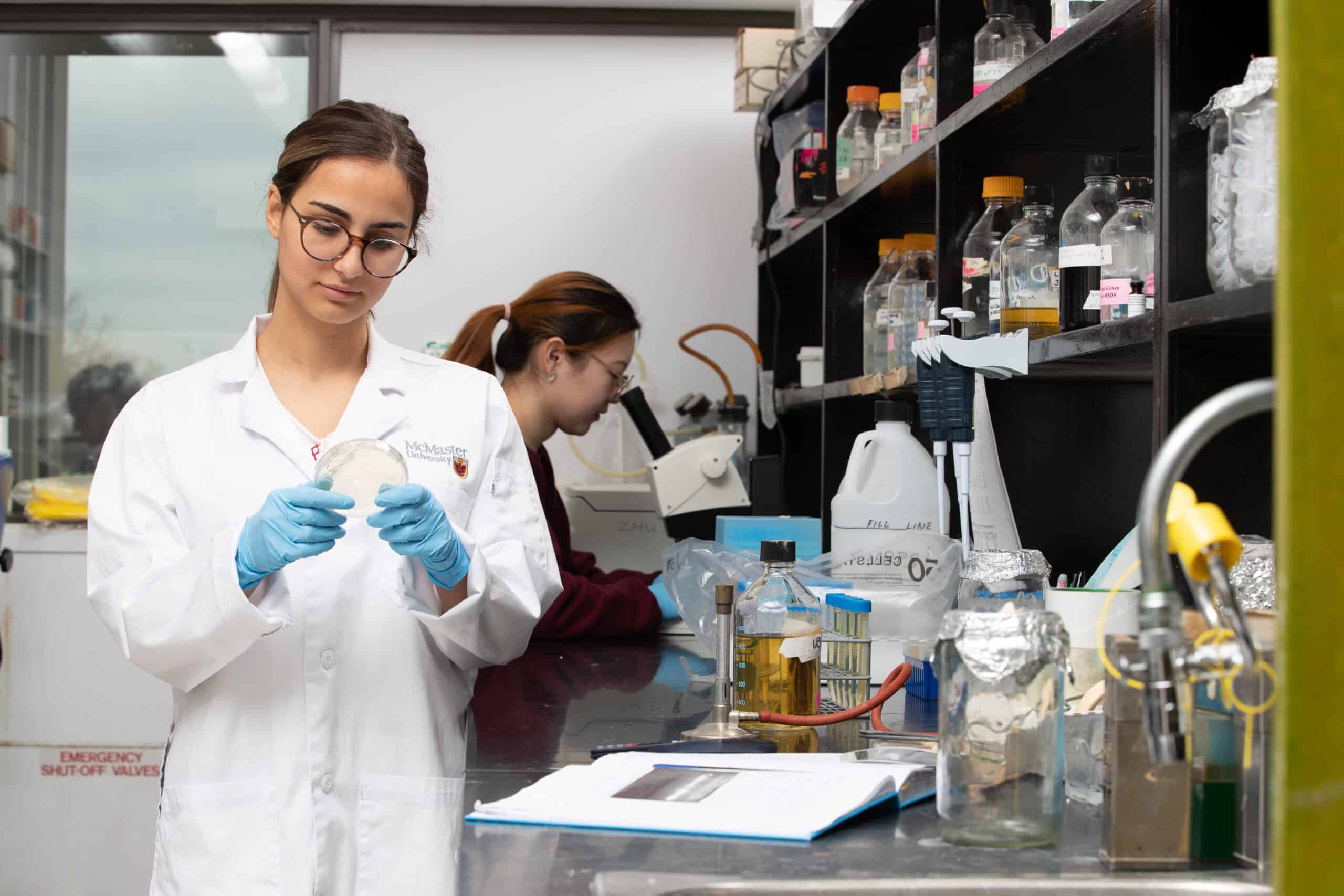Daniela Giansante is in her third year of a bachelor’s programme majoring in Psychology, Neuroscience, and Behaviour at McMaster University. She was drawn to McMaster’s Faculty of Science for the many opportunities and believed they make a good foundation to prepare her for her future career.
“In my search for academic direction, the Life Sciences Gateway programme proved invaluable, offering me the chance to explore various subjects and swiftly identify the ones I wished to pursue,” Giansante says.
The programme’s diverse courses allowed her to engage directly with each subject, clarifying her interests. “What greatly appealed to me was the flexibility to specialise in a Level II programme based on the subject I wanted to pursue,” Giansante says.
Beyond these academic considerations, Giansante’s initial visit felt like discovering a second home. The welcoming and warm atmosphere fostered by faculty and students resonated strongly with her and left a lasting impression.
Explore, discover, and specialise
McMaster Science is filled with the energy of discovery, offering a vibrant academic environment for over 6,800 undergraduate and 600 graduate students. With a diverse student body representing over 125 countries, there’s no shortage of global perspectives that’ll set you up to thrive in a multicultural world. Graduates are known for the creativity and collaborative spirit they bring to the workforce, as well as their innovative thinking and critical problem-solving skills. In other words, this is where students find a launchpad for a future in their chosen field in science.

The first-year interdisciplinary model encourages exploration across all science areas, helping students identify their specialisation based on interests. Source: McMaster Science
Your first year at McMaster won’t be like any other. Instead of being pigeonholed into a single discipline, you’ll explore all areas of science. Through four interdisciplinary Gateway Programmes, including Chemical and Physical Sciences, Environmental and Earth Sciences, Life Sciences, and Mathematics and Statistics, you can build a strong foundation before making an informed decision on which 33 exciting options you’d like to specialise in. This journey doesn’t end there. The faculty actively encourages cross-disciplinary exploration, ensuring your path remains dynamic and aligned with your evolving interests.
It’s something Rubab Masaba, a Life Sciences student, is grateful for as she doesn’t have to give up one part of science to study something else solely. “It is the perfect programme for those interested in all spheres of science,” Masaba says. “I was not sure if I would be ready to commit myself to one specific programme for the rest of my life, but as Life Sciences is quite interdisciplinary, I am still exploring my options, and I know I have diverse options after my undergraduate studies.
McMaster has a wide array of specialisation options, each equipping you with the skills and knowledge to excel. Dive into Medical and Biological Physics, where you’ll learn about the innovative technologies used to diagnose and treat diseases. Passionate about sustainability? Sustainable Chemistry offers a chance to explore eco-friendly solutions, while Biodiversity and Environmental Science equip you to tackle our planet’s challenges. And if numbers are your forte, the award-winning Actuarial and Financial Mathematics programme readies you for a highly sought-after career path in the financial industry.
After Giansante’s first year, she decided to focus on the Psychology, Neuroscience, and Behaviour programme (PNB). While she had always harboured an interest in these subjects, it wasn’t until she joined the first-year psychology courses, that she was certain of her potential and passion in this field. “The content presented, the professors, and the overall design of these courses were exceptional and made me realise that this was precisely the path I wanted to pursue. That’s why I applied for the PNB programme,” she says.

McMaster graduates ranked 85th globally and fifth in Canada, are among the world’s most employable, according to Times Higher Education. Source: McMaster Science
Real-world preparation: Experiential learning and research opportunities
At McMaster Science, experiential learning takes place through various avenues. The Office of Undergraduate Research connects students with world-renowned faculty, while co-operative education programmes provide paid placements in prestigious companies and research institutions. Whether it’s dissecting the intricacies of the human body or analysing the impact of climate change, hands-on opportunities abound, transforming textbook concepts into tangible realities.
Research centres like the McMaster Centre for Climate Change and the Brockhouse Institute for Material Research bring together leading academics and industry partners to tackle complex global challenges. Students have the chance to work alongside some of the country’s best minds, contributing to important discoveries while witnessing the real-world impact of scientific endeavour. Just ask Giansante, who has actively participated in research initiatives.
“In my second and third years, I took part in research project courses, allowing me to collaborate with professors and contribute to their meaningful research,” Giansante says. “The university has been very supportive regarding providing research opportunities for students, for example, offering courses that provide advice and support on securing research positions.”
Career-ready from semester one
McMaster Science understands it’s crucial for graduates to be prepared for their chosen careers. The Science Career & Cooperative Education office guides you through 13 programmes offering co-op opportunities, allowing you to gain valuable industry experience while earning a degree. Whether you dream of working in a lab, developing sustainable solutions, or using your analytical skills in finance, McMaster equips you with the knowledge, skills, and network to thrive.
As a McMaster graduate, you’ll join a network of over 227,000 alumni, including four Nobel laureates and 34 Olympians. You’ll be part of a legacy of excellence and innovation, ready to make your mark on the world.
Click here to learn more about the McMaster Science.
Follow McMaster Science on Facebook, X, Instagram, and LinkedIn










